Do you want to know more about how to become an eating disorder dietitian?
Check out this article for all things ED RD including what ED RD’s do, education requirements, salaries and much more!
Do you want to know more about how to become an eating disorder dietitian?
Check out this article for all things ED RD including what ED RD’s do, education requirements, salaries and much more!
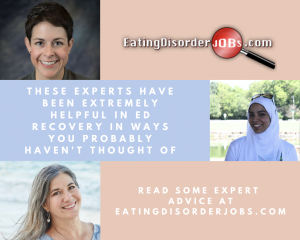
“It is not uncommon for individuals to have a personal connection to the work they do, which can make them excellent stewards for change. I have found it to be particularly important to have reached a steady point in one’s mental health where you’re able to engage responsibly and diligently in the work that is so close to your heart. That certainly doesn’t mean someone can’t have a lived experience and not get emotional during this work. However, it requires great self-reflection, healing and taking care of your health first. There are so many ways to support work in mental health fields without it consuming your 9-5. I would encourage individuals to think broadly about the contribution they want to make and how working on yourself is a cornerstone of whatever contribution we give to the world.” – Allison Ivie
“It can be very intimidating to go against the grain, once you start unpacking weight stigma — especially when so many educational institutions and health service providers do not practice in ways that respect and protect all bodies. So be that person who speaks up. Set boundaries. Have difficult conversations and have them unapologetically. You will get better at it with time.” – Fatmah H. Al-Qadfan, Registered Drama Therapist
“Every job is an opportunity to learn – even if what you learn is you don’t want to work there anymore. In other words, take what you can from each job, nothing is beneath you, but know that when you go out on your own, you don’thave to do things the way others do. Remember the things that infuriate you so you don’t recreate those situations later. Take risks and try not to let your worry of what others think hold you back. Apply for any job that interests you, even if you don’t have the requested years of experience. Sometimes enthusiasm overrides those requirements. And please, please, please find someone you can talk to about your own issues, history and internal reactions. Whether it’s a professional supervisor, therapist, professional support group, or someone in your personal support system, it’s so crucial to your mental health to have a safe place to vent and explore your personal reactions to what you’re experiencing at work.” – Jessica Setnick, MS, RD, CEDRD-S
“Cultivate healthy doses of curiosity and creativity, develop a sense of humor, and find where your passion lies. Working effectively with eating disorders requires an ability to look at both the bigger picture and the details, to use your intuition as well as your intellect, and to think outside of the box. I would also recommend a commitment to personal growth and spiritual development so that you know how to feed your soul — since much of the work is teaching those you work with how to do just that.” – Anita Johnston
Check out these experts’ full interviews at https://eatingdisorderjobs.com/category/advice-from-experts/ and search the right column for their name.
Ever wanted to join the field without a science heavy background allowing you to be a practitioner? Remember, the field needs people to run the show behind the scenes as well. Over the years we’ve interviewed a variety of experts who work on the administrative side of eating disorders. Check out their advice below.
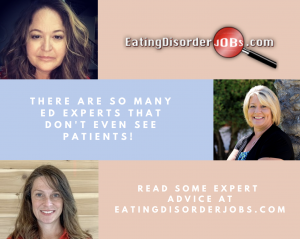
“Be a student. Learn as much as you can. No one expects you to be an expert especially when you’re starting out. Look at your role as relationship building. No one in this field appreciates a sales pitch or aggressive tactics. Also, be respectful of other programs and reps. Understand that people get help in a lot of different ways and in different settings, and work to establish relationships with others who do your same job. There is no one-size-fits-all when it comes to treatment and sometimes the best referral is to a program other than the one you represent. People will trust and respect you if you make appropriate and well thought out referrals.” – Krista Lample
“If your position is a traveling one, always have a toiletry bag in your suitcase, trust me, you will thank me for this one! If you do not know the answer to a question about your program, its okay to say, I am not sure and get back to the professional in a timely manner.” – Dana Suitor
“Network and build connections with those that are in the field/area you want to work in; you never know what opportunities will come. Continue learning and growing in your practice regardless of the work you do as there is so many complex cases regardless of what field you are in.” – Becky Mehr
“Don’t think that you need to be a clinician or have an advanced degree to work in this field! I love working in outreach, it gives me an opportunity to engage with professionals from all over and to participate in wonderful educational opportunities that further my understanding of these disorders and the people they impact. My motto is “be a resource, not a sales pitch”. There is nothing I value more than connecting people to resources. That may be helping them learn more about my program, or it may be getting them set up with a local non-profit for support groups, or helping a family with some insight on how to advocate for themselves during the admissions process. This community is full of folks who are truly passionate about helping others, and I am so thankful for where I have landed in my career.” – Fiona Larosa-Waters
“If you are interested in working in eating disorders, get the training you need. If you are a graduate student or just beginning in the field, do a postdoctoral fellowship in eating disorders. Work in higher levels of care such as residential, partial hospitalization and intensive outpatient to get experience. Do certification through the International Association of Eating Disorders Professionals (iaedp). If you are not new to the field, get supervision by an iaedp approved supervisor, get training through iaedp and do continuing education through The Alliance for Eating Disorders Awareness.” – Dr. Joann Hendelman
“My advice is to commit to doing your own work, both before you enter the field, and definitely while you are working in the field. It is the greatest gift you can give to yourself and will make you a more compassionate and effective therapist.” – Dawn Delgado, LMFT, CEDS-S, EMDR-Certified
“Be ready to examine your own thoughts and beliefs about the world. Being effective in the world of eating disorders means that you have to “walk the walk” and not just “talk the talk”. Examining how you interact with and participate in diet culture is the first step.” – Whitney Russell MS, LPC-S, CEDS-S
“Start supervision as soon as you know you are interested in pursuing a career in eating disorders (and never stop! Peer supervision is invaluable throughout your career).If you have struggled with an eating disorder or disordered eating, ensure that you’ve worked through issues you have had about food, weight, and exercise so you are strong for your client. Collaborate, collaborate, collaborate – Always work with a therapist and medical provider for diagnosed eating disorders.” – Beth Harrell, MS, RD, LD, CEDRD-S
“Read books, attend seminars and workshops, join BHN (Behavioral Health Nutrition), participate on their listserv, and get at least one mentor which includes an RDN for professional supervision.” – Karen Wetherall, MS, RDN, LDN
“A piece of advice that I would give to new professionals coming into the field is build your network. The eating disorders field has so many passionate and knowledgeable professionals who are so open to connecting and mentoring. Get involved in any local or regional professional organizations, and attend as many educational or networking events as you can. Nowadays even following and actively engaging with other eating disorder professionals on social media can be a great way to expand your circle. Nearly all of my professional opportunities came through my networking connections, and these relationships are so important in so many aspects of what I do now… and the members of the eating disorder community are some amazing human beings to get to know!” – Jenn Burnell MS, RDN/LDN CEDRD-S
“Seek out connections with colleagues who also specialize in eating disorders. They will likely end up being some of your closest friends and will help you develop personally & professionally.
Attend the major eating disorder conferences to earn CE/CEU credit, network and stay abreast of all the developing trends and evolutions in treatment. Walk around the exhibition booths and learn about the various providers and programs.
Take care of yourself and realize that you must be able to set effective boundaries between work and home life, in order to go the distance in your career.” – Jacquelyn Ekern, MS, LPC
“Treating eating disorders is a rewarding but difficult job. Not much training or education on how to treat eating disorders will happen in school. You will need to get training from an eating disorder professional and attend eating disorder conferences and seek out eating disorder certification.
You will have to learn to be strong as well as kind, know how to challenge and set limits, be firm, and directive, self-disclose, be authentic and deliver the right balance of nurturing and authority. Expect your clients to lie and not want your help, expect them to slip up and even relapse but also expect them to be courageous, gifted, giving and overall incredible humans.
Treat every client who walks in your door as if he or she can be fully recovered. Each client has a healthy/soul self, he/she was born with an eating disorder self. Your job will be to strengthen the client’s healthy self so it takes over the job of the eating disorder self. The eventual goal is to help integrate the two selves back into one whole being.
It will help if you pay attention to the difference between ego and soul. The eating disorder is ego out of control. People suffering from eating disorders need to reconnect to soul and leading a more soulful life. The best way to do this is to bring your own soul self forward.
Treating eating disorders will make you think about your own values, your own body and your own life. You might even get triggered. Seek consultations and supervision for yourself in this regard.
I hope your work in eating disorders will be an incredible and rewarding journey like mine.” – Carolyn Costin, MA, Med, MFT
Check out these experts’ full interviews at https://eatingdisorderjobs.com/category/advice-from-experts/ and search the right column for their name.
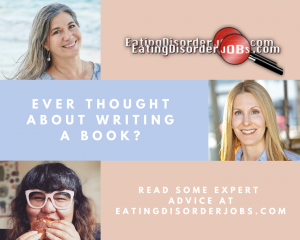
“Follow your passion and your interests and bloom where you are planted. Again, I didn’t go looking for the work I do today. It found me. I hope that is some reassurance for anyone reading this who doesn’t know what they want to do or doesn’t think they can ever do what they want to do! My best advice is this: just wake up each day and take the next right step…whatever it is. Along the way, become your own best friend. Just get to know yourself – your likes, your strengths, your preferences – really, really well. Because whatever you are going to contribute, it is something only you can offer and something you are uniquely qualified to do – and not just by your credentials but by your life experience. Your work is reserved for you alone, and whatever it is, I can promise you this world needs it and it needs YOU.”- Shannon Cutts, Freelance writer, recovery mentor, pet blogger.
“Be open minded to all job opportunities and never say no to any job opportunity as you never know that you may end up liking another area of dietetics and develop a specialty. This can result in also becoming more well rounded in the field. I am so thankful that I was a clinical dietitian as it has helped me see many other types of clients in my practice, write a book that includes a significant amount of medical understanding and be used as an expert by other clinicians and media outlets.”– Robyn L. Goldberg RDN, CEDRD-S,The Eating Disorder Trap., Inc.
“There’s so much more training and supervision available now than when I was “growing up” in the field. If you can afford it, go to multidisciplinary conferences, specialty trainings, and get supervision across the disciplines. With little funds (but extraordinary value), you can learn a tremendous amount on the IFEDD listserv; I learn there every day.” – Leslie Schilling MA, RDN, CSCS, CEDRD-S, Born to Eat
“The ED professional world needs critical approaches. It needs queer people, BIPOC, disabled people, fat people, working class people, trans and NB people. The ED space isn’t just clinicians. It’s podcasters, it’s educators who teach people how to create environments that don’t trigger people, it’s writers, it’s editors, it’s influencers, it’s parenting experts, it’s entrepreneurs. So, trust your gut, figure out how to incorporate ED into what you’re good at and what you love, expect pushback when you’re onto something powerful, be an early adopter, shake things up and follow the need not the rules. I remember being in grad school and my advisor saying that pursuing a career centered around fat people was “career suicide.” I’ve published three books and speak all over the country on this topic. Wow, was she wrong. There is so much room for innovation in the ED space! I think about the fact that the ED world is just beginning to understand that disordered eating is connected to weight stigma. This is so mind blowingly obvious, and yet it took decades to get here because the right people either weren’t in the room or they weren’t speaking their minds. The world of ED treatment has the potential to look totally different within a few decades. Be part of that shift. Listen to your intuition when you think about what’s working and what’s not, and instead of giving up or giving in, find the allies and the resources you need to make changes that help people.”- Virgie Tovar, author, educator, podcaster and fat activist
“If you are currently in recovery from an eating disorder, I cannot emphasize the importance of taking care of yourself first. Make sure that your recovery is solid. You cannot give away to others what you don’t have. Believe in yourself, and don’t quit until you reach fully recovered. After recovering from an eating disorder, you will find a new resilience and strength. Both can be harnessed to create your dream career. I’d encourage you to get involved in nonprofits like the National Eating Disorders Association, and attend professional conferences. The eating disorders field is very welcoming.” -Jenni Schaefer Bestselling Author, Speaker, Singer/Songwriter
“Cultivate healthy doses of curiosity and creativity, develop a sense of humor, and find where your passion lies. Working effectively with eating disorders requires an ability to look at both the bigger picture and the details, to use your intuition as well as your intellect, and to think outside of the box. I would also recommend a commitment to personal growth and spiritual development so that you know how to feed your soul — since much of the work is teaching those you work with how to do just that.”– Anita Johnston Ph.D, Eating in the Light of the Moon
“If you are trying to get into the field, but continue to find road blocks due to lack of experience, try to get experience in non-employment avenues. Reach out to local eating disorder dietitians and see if they have any part-time, volunteer, or shadowing opportunities. Become a member of the local and/or national eating disorder organizations such as IFEDD(international federation of eating disorder dietitians) and iaedp (international association of eating disorder professionals) and make connections with those currently in the field. Let everyone who will listen know that you are looking to get into the field. Paid experience is not the only experience of value. If you are new to the field, learn as much as you can and never assume you know enough about the treatment of eating disorders. Attend any and every educational opportunity about eating disorders even if it is not specifically geared towards dietitians. Make sure you are receiving adequate supervision and if you are not seek it out from a Certified Eating Disorder Registered Dietitian Supervisor.” – Casey Bonano RD, LD, CEDRD
Check out these experts’ full interviews at https://eatingdisorderjobs.com/category/advice-from-experts/ and search the right column for their name.
Let’s not forget about the experts who are widely known in our field but live or work in other countries.
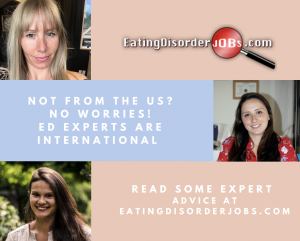
“Imposter Syndrome is very real. It is always good to balance that out with reminding yourself what you know and what you don’t while making sure to stick within your scope of practice. One of the things that has helped me the most is attending webinars, reading books, and just getting my hands on any ED-related material I can. This field is challenging and yet so rewarding. Always keep in mind the nature of eating disorders … Progress in recovery usually has nothing to do with you as a clinician. Sometimes it’s good to remind yourself of that!” – Clair El-Jor MSc, LD (Lebanon)
“If a student wants to get into this area I think you need to be prepared to do a lot of work. Including self work. I have listened to 100s of podcasts, read articles, joined ED FB groups to read and listen to sufferers to understand perspectives on treatment models. You need to learn skills that you don’t get in your RD degree. Working in a team with parents, partners, GP, psychologists – and most of the time you will know more than the rest of the team. You will become skilled in the medical, pharmacology, psychology, nutrition, therapy, exercise and genetics because it’s all so related to the food. You will be versed in the guidelines in all areas to help guide the rest of the treatment team with best practice. And you will be so passionate about it you won’t even care that you don’t get paid for 90% of the work you do.” – Victoria Schonwald RD (New Zealand)
“Be gentle with yourself. I know for myself the drive can be strong to want to fix everyone and take their pain away, and this can create intense and unrealistic pressure on myself (and them!). Focus on what you can control and on being the most caring, authentic, competent provider you can be, and then know that this is also everyone’s own journey. Find ways of loving the work for the connections it allows you to make with amazing individuals and for how neat it is to be able to be a part of their journeys, whatever path it takes.”- Sarah Rzemieniak (Canada)
“ I began working with provincial and national athletes through the Sport Medicine and Science Council Manitoba and then the Royal Winnipeg Ballet. I decided I needed to be part of a larger networking group and became a member and shortly after co-chaired the Dietitians of Canada Sport Nutrition Network. I started to attend conferences such as SCAN, ASCM, Eating Disorders in Sport Conference etc. With continuing education such as the International Olympic Committee Diploma in Sports Nutrition and networking and openness to mentorship, I landed my current full time position with the Canadian Sport Centre Manitoba (CSCM). My work in sport opened my eyes and my heart to the world of dysfunctional eating behaviors and that not one “type” of sport or athlete or human is immune.”- Jorie Janzen CSSD (Canada)
“My best advice to someone new in the field is to build a community of likeminded peers that share your values for the work you do. So much of our clinical work is rooted in developing expertise and learning new ways to treat clients and different modalities, that the learning process can be incredibly isolating. Start with what brings you meaning and value first, and you will never lose sight of your purpose. Bring others along with you who share your visions and work together on making it happen.”– Meghan Watson M.A. RP (Canada)
Check out these experts’ full interviews at https://eatingdisorderjobs.com/category/advice-from-experts/ and search the right column for their name.
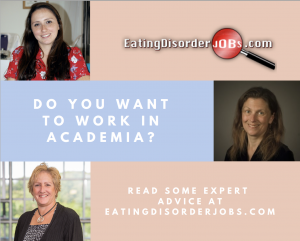
“Be curious and read! Research is the foundation of evidence-based practice. If you learn how to read, think critically, discern and apply research, you are going to be a strong and respected clinician. These are skills learned largely in graduate school. These skills need to be practiced! So read, and read often; discuss research with colleagues; make it part of your commitment to being a lifelong learner. Read books and blogs in the consumer sphere also. Understand the lived experience and the diversity of the lived experience as much as you can. In addition, get as much specialty training as you can through webinars, podcasts, courses, conferences, clinical supervision, etc. Take your first job in an ED treatment center where you have lots of dietitian colleagues and a multidisciplinary treatment team at your side so that you can learn from their wisdom, experience and collaboration. This kind of on-the-job training and supervision is both invaluable and necessary to develop your clinical competence in this challenging niche of practice. Learn to be an effective listener. Your listening (and counseling) skills will endear you to your clients, allow you to build empathy, and cultivate effective and sustainable working relationships with your clients. Above all, practice consistent self-care. This work is demanding and hard but it is also incredibly rewarding.”- Paula Quatromoni DSc, RD
“Imposter Syndrome is very real. It is always good to balance that out with reminding yourself what you know and what you don’t while making sure to stick within your scope of practice. One of the things that has helped me the most is attending webinars, reading books, and just getting my hands on any ED-related material I can. This field is challenging and yet so rewarding. Always keep in mind the nature of eating disorders … progress in recovery usually has nothing to do with you as a clinician. Sometimes it’s good to remind yourself of that!” – Clair El-Jor MSc, LD
“Stay open to a complex and integrative perspective on body image and eating problems—one that explores their spiritual dimensions and that thinks critically about the cultural underpinnings of these problems. This openness will foster an understanding of eating disorders as responses to human suffering that tragically create more suffering. Such an understanding fosters the compassion that is necessary for the process of healing. I urge new professionals in the field of eating disorders to investigate the spiritual needs that obsessions with food and weight thinly veil, and I would encourage them to define “spiritual needs” very broadly (i.e., in non-sectarian terms), including the need for a sense of purpose, love, inspiration, courage, community, agency, and peace.” – Michelle Lelwica Ph.D
“Go for it…while getting training and support. I highly recommend Eating Disorders Boot Camp & Molly Kellogg’s Counseling Intensive, as well as Molly Kellogg’s phone supervision.”– Amy Culp RD, CSSD, LD
Check out these experts’ full interviews at https://eatingdisorderjobs.com/category/advice-from-experts/ and search the right column for their name.